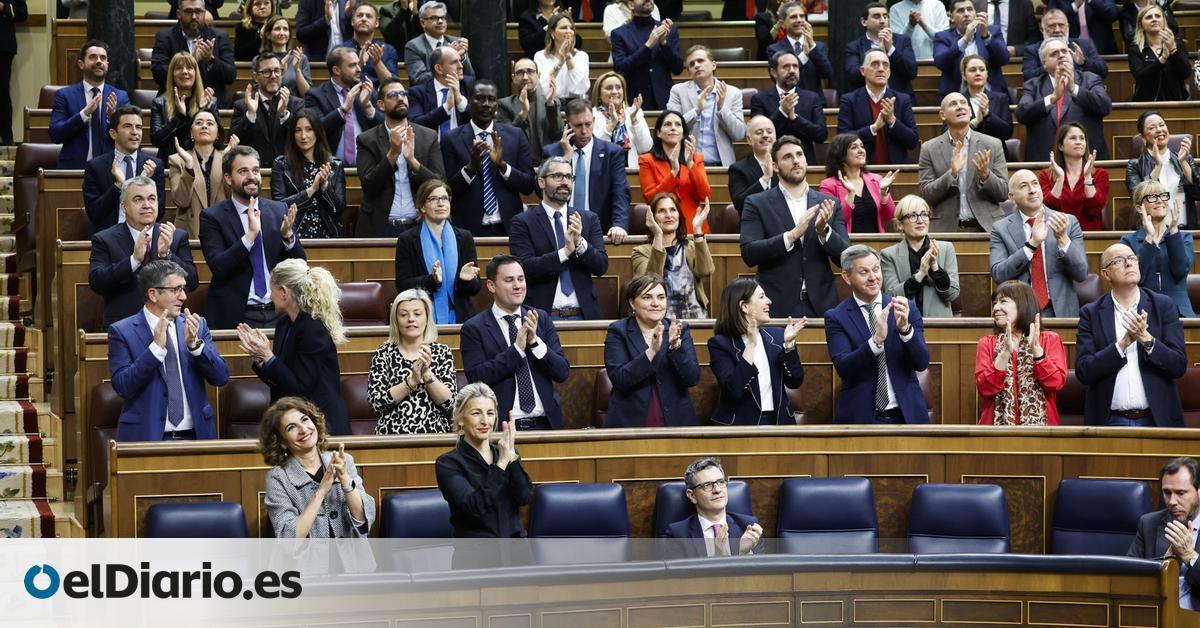
It was the second and last attempt, and Congress has approved the amnesty law. After months of negotiations on the brink of rupture, and with last-minute agreements, the absolute majority of the Lower House has accepted the text of the norm with which the Government wants to recover “concord” in Catalonia, in the words of the president of the Government, Pedro Sánchez. The law is now on its way to the Senate, where the absolute majority of the PP will try to delay it and trip it up as much as it can.
The law passed this Thursday with 178 votes in favor and 172 against. The PSOE has managed to rebuild the majority of Sánchez’s investiture, especially the support of Junts. Those of Carles Puigdemont already knocked down the bill last January, which caused a second and final negotiating round that was resolved a week ago in the Justice Commission.
A complicated negotiation that has been closed just when the legislature in Catalonia is coming to an end. The ERC Government has not managed to carry out the regional budgets, and President Pere Aragonés has called elections for next May 12.
Precisely ERC has celebrated, regardless of the current political situation in Catalonia, that this law is headed to the Senate “after many scares”, to return to Congress and finish “black on white” in the Official State Gazette. “For four years we have been saying that this law has to exist,” said Republican deputy Pilar Vallugera, who thanked Junts for the tone of her intervention during the debate.
“This does mean that today could be a great day,” he celebrated. And not like about two weeks ago, when the post-convergents rejected the text that the PSOE had agreed with the rest of its parliamentary partners. Junts has defended that this law, and not the one from fifteen days ago, “is adjusted to international law and prepared for European compliance.”
With this new wording, Carles Puigdemont’s party understands that all those prosecuted by the process will be covered, even those whom some judges have begun to investigate for alleged terrorism.
“From the beginning of its journey we said that it was necessary to amend [la ley] to have a rule with more guarantees,” said Josep Maria Cervera, who defended Junts’ position on the platform. Cervera has assured that the recommendations of the Venice Commission, which visited Spain a few weeks ago at the request of the PP to evaluate the legality of the law, at the request of the PP, have helped to improve the standard.
However, both pro-independence groups have agreed that this is not an end point. Cervera stated this Thursday that the law opens an opportunity to negotiate “one to one” the future of a Catalonia that they want, he said, to be “free.”
And Esquerra Republicana has said that this step is a “condition of possibility” but not “sufficient.” “We will continue on the path of national liberation through democratic, peaceful and dialogue-based paths,” said Vallugera.
In the turn of the popular ones, the leader of the opposition, Alberto Núñez Feijóo, took the floor, using this Thursday’s parliamentary debate on the amnesty law to make a campaign speech after the call for the regional elections on the 12th. of May. “This will be the first important law of the legislature, and probably the last,” Feijóo said on the platform from which he defended his party’s ‘no’ vote. “The call from Catalonia shows how they govern,” he stated. “They are the greatest agent of political instability. They do not think about the problems of the Spanish or the Catalans. “They defend their interests and act with blackmail,” he added.
“Between now and May 12 there will be a party that defends the interests of the majority, and not just politicians; that defends a better policy. And he is not going to ask for the constitutionalist vote to hand it over to the independentists. The PP of Catalonia, which by the way has gotten more votes than you in the general elections, we are not going to leave the Catalans that you want to erase as if nothing had happened or suffered anything,” he said.
Feijóo has also defended that “the Catalan elections will mark the beginning of the end of this Government” because “when Sánchez stops being useful, they will let him fall.” But he has also warned Junts that “perhaps ERC and the PSC have wanted to deceive them so that the amnesty does not arrive on time.”
Previously, the spokesperson for the socialist parliamentary group has made a passionate defense of the amnesty law. “Politics is to offer alternatives, seek understanding, defuse conflicts, give back to those who live in permanent confrontation the hope of reconciliation. We had the obligation to fix what you ruined,” he said.
Feijóo has denied in his turn that the law is going to promote “reconciliation” in Catalonia because, he said from the podium, “this law divides Catalonia and Spain in two.” “What reconciliation do you see in the threats of the independence movement?” He has maintained, in reference to the fact that both Junts and ERC have defended that their political project will continue to demand the self-determination of Catalonia.
“It is not reconciliation, it is submission,” said Feijóo. “Pedro Sánchez depends on what Mr. Puigdemont says, and what Mr. Ábalos does. Nothing more,” he said. “What lies ahead is not a legislature, it is agony,” he stated.
Feijóo has anticipated that the Senate will reject the amnesty law thanks to the absolute majority of the PP, so the norm will have to return to Congress for its final endorsement. There is a period of approximately two months for this, but the right will try to extend it as much as possible in the Upper House, so it is most likely that the norm will not be definitively approved until after the Catalan elections.
Source: www.eldiario.es

